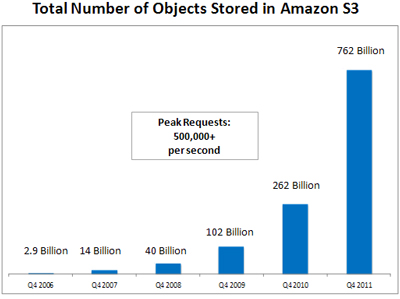Amazon's S3: 762 Billion Objects Stored
Amazon remains secretive about revenues from its business in providing cloud services to enterprises, and nothing was said in this week's earnings announcement to shed further light on the question. But if you consider the amount of content stored in its cloud service as any indicator, Amazon Web Services (AWS) is growing like gangbusters.
At the end of 2011, there were 762 billion objects in Amazon's Simple Storage Service (S3), up nearly three-fold, or 192 percent, from the 262 billion objects stored at the end of 2010. "S3 grew faster last year than it did in any year since it launched in 2006," said AWS evangelist Jeff Barr in a blog post that revealed the latest metric.
It is widely believed that AWS was close to a $1 billion business in 2011 and, based on the $1.5 billion in annual revenues classified as "other," that appears to be on target.
Last year, Amazon's S3 annual growth was two-and-a-half-fold and, presuming it stays even close to the same trajectory, the number of objects will be in the trillions this year. Barr said Amazon is looking to expand the S3 team and has posted open positions for several software engineers, a senior product manager and a director.
 |
| Source: Amazon Web Services |
Meanwhile, looking to address one of the largest complaints about AWS -- that it has limited customer support -- the company plans to role out new services for its Gold and Platinum AWS Premium Support offerings. In beta now, Amazon plans to offer support for operating systems including Microsoft Windows, Ubuntu Linux, Red Hat Linux, SuSE and the Amazon Linux AMI.
The service, called Third Party Support, also lets customers ask for help with and administering Apache and IIS Web servers, Amazon SDKs, Sendmail, Postfix and FTP, according to Barr in a separate blog post. "A team of AWS support engineers is ready to help with setup, configuration, and troubleshooting of these important infrastructure components," Barr said.
Amazon is also readying a new service, called AWS Trusted Advisor, that will allow the company to inspect a customer's cloud environment and report on how they can save money, improve performance and address security holes, according to Barr.
"AWS Trusted Advisor does not have access to customer data," he said. "Recommendations are made by analyzing information gathered using a constrained set of internal and documented AWS API calls."
Posted by Jeffrey Schwartz on 02/01/2012